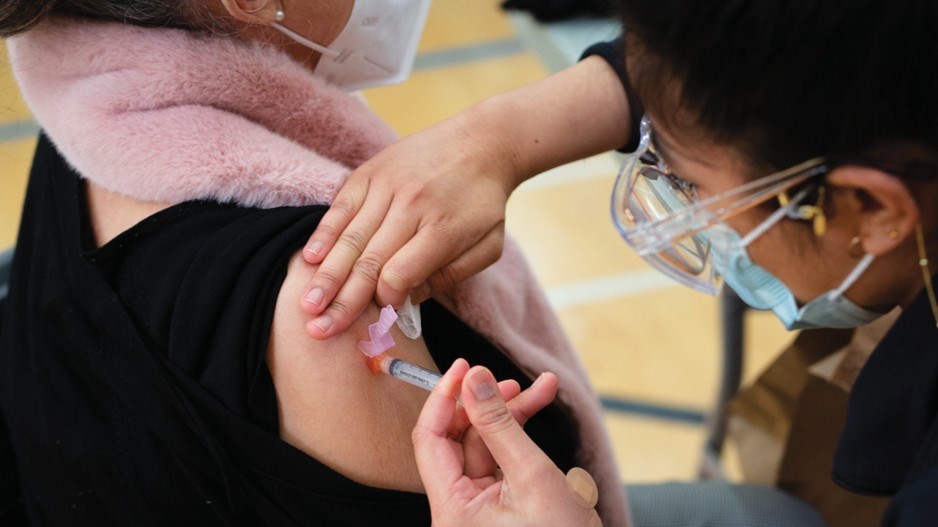As Ottawa tightens border restrictions and other provinces attempt to accelerate their COVID-19 booster shot campaigns, B.C. is sticking tight to its timeline to get most residents their third doses by early in the new year.
Ontario is opening up bookings for boosters to all those 18 or older beginning Monday amid concerns over the Omicron variant, which has been found to be more transmissible than the dominant Delta variant.
Case rates tied to the variant have been on the rise in B.C., but provincial officials made clear during an unattributed technical briefing Friday a holiday push was not in the works. Instead, it would be standing by its timeline of getting most of the general population vaccinated in January or February.
And the booster campaign may not even finish until March, according to the government.
Health officials have previously said part of the reasoning for sticking to the January-February road map is so that boosters are administered at a long enough interval to provide maximum protection rather than shorter intervals between doses that would reduce protection against COVID-19 and its variants.
B.C.’s goal is to administer third doses at least six months after recipients’ second doses in a bid to maximize protection.
About 500 pharmacies across B.C. are administering shots as part of the latest vaccination campaign. The previous mass vaccination campaign for British Columbians’ first two doses relied heavily on mass vaccination clinics that have now mostly shuttered.
Some sites administering boosters will be closing down or reducing hours during the holidays.
About 1,000 pharmacies are expected to be administering doses by mid-January.
Canada currently has 22 million booster doses “in stock,” federal Health Minister Jean-Yves Duclos revealed Friday.
Meanwhile, the government also announced it was issuing a new order from the Provincial Health Office extending its vaccination card requirements for events of all sizes beginning Monday.
“Right now we need to slow the spread and ensure that our health-care system and communities are protected,” provincial health officer Dr. Bonnie Henry said during a public briefing later in the day.
The province currently requires attendees at indoor gatherings of 50 people or more, such as concerts or screenings at movie theatres, present their vaccine certification to gain entry.
The new requirements mean events under that 50-person threshold will now require attendees to present proof of full vaccination. This includes funeral receptions outside funeral homes, organized parties, trade shows and conferences.
Large venues hosting more than 1,000 people — for example, Rogers Arena, where the Vancouver Canucks play – will also be cut down to 50%.
“In addition we need to step up our scanning of the QR code,” Henry said, referring to B.C.’s vaccine card.
Some businesses in the province scan QR codes attached to users’ vaccination certification on their phones to verify their status. Workers at other businesses may only eyeball the name on the certificate to ensure it matches a patron’s identification.
The province is also limiting indoor personal gatherings to residents of a household plus 10 additional individuals, or else one additional household if all are aged 12 and older and are fully vaccinated.
“The number 10 is about having a manageable group,” Henry said when pressed on the potential for confusion over the new limit on personal gatherings.
“We say another household because sometimes we have very large households.”
The new order sees the province suspending all sports tournaments and cancelling all organized New Year’s Eve parties, unless they are seated-only events such as restaurant gatherings. No restrictions on hours of operations or access to booze will be imposed, unlike last year when many restaurants were informed of restrictions at the last minute.
All the restrictions announced Friday are scheduled to be lifted Jan 31.



